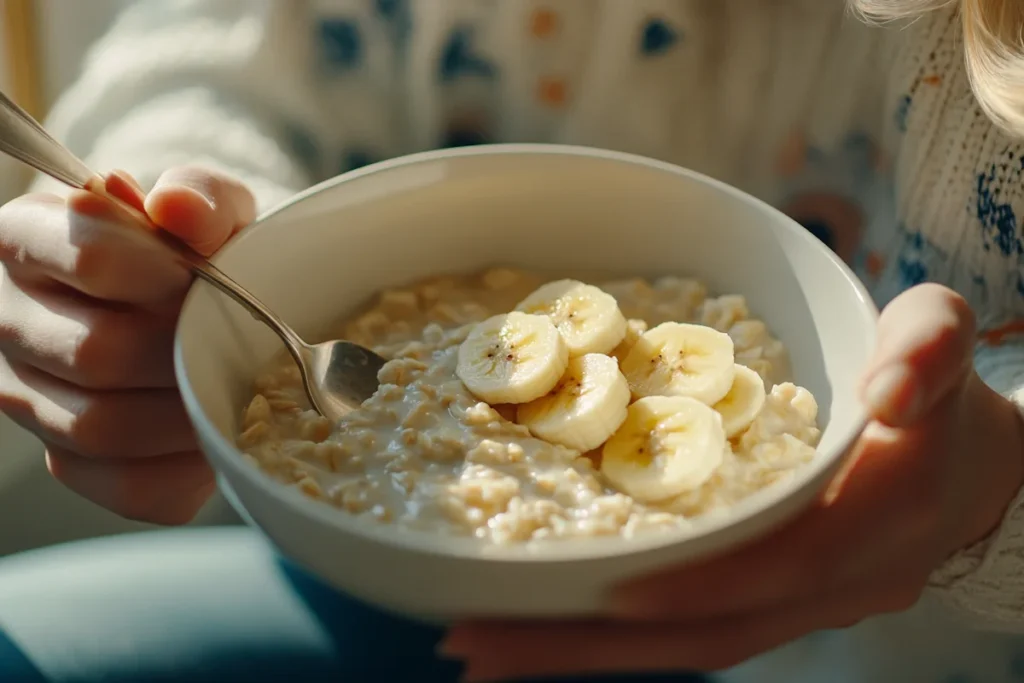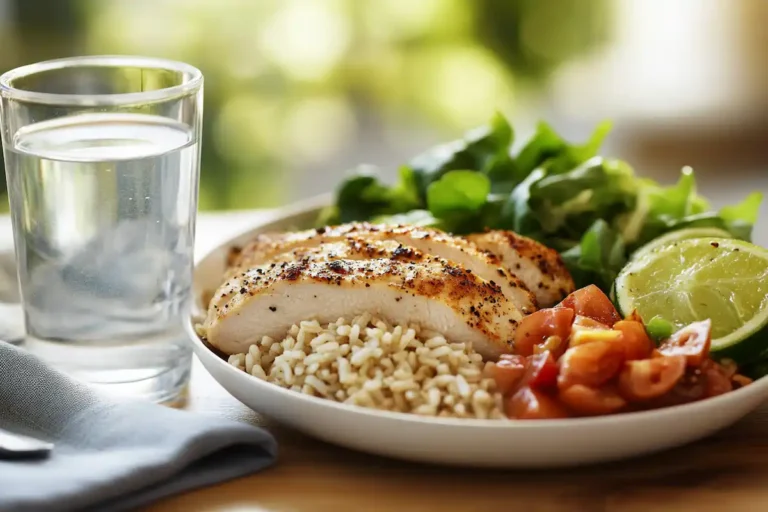Introduction
Competitive eating is more than just devouring large quantities of food. It’s a test of endurance, mental focus, and proper preparation. If you’ve ever caught yourself wondering, “What should I eat the day of an eating competition?”, you’re in good company. This question arises because your day-of meal plan can make or break your performance. You need a strategy that not only keeps you energized but also optimizes your stomach capacity for the massive challenge ahead. This guide dives deep into the details, offering you practical tips, ingredient breakdowns, step-by-step preparation, and pro-level strategies to ensure you’re ready to face any food contest that comes your way.
In the following sections, we’ll look at the fundamentals of competitive eating, how you can train your body in the days before the event, and outline precisely what should I eat the day of an eating competition to excel. By understanding these principles, you’ll gain an edge over your rivals and turn your eating challenge experience into a victorious journey.
1. Understanding Eating Competitions
Eating competitions can vary greatly. Some focus on speed, while others require participants to consume as much food as possible within a set time frame. Whether you’re stuffing down hot dogs at the iconic Nathan’s Hot Dog Eating Contest or tackling a family-sized pizza challenge at your local restaurant, the approach to preparing remains similar: expand your stomach capacity, regulate your hydration, and carefully select the right foods before the event.
Yet, even with these general strategies, one crucial question always resurfaces:
What should I eat the day of an eating competition?
The best competitors know that their day-of diet can impact everything from initial bite to final swallow. Here are some key points to consider:
- Stomach capacity: Successful competitors often train by gradually stretching their stomachs through controlled practice sessions.
- Hydration: Drinking large amounts of water helps with stomach expansion and keeps you hydrated.
- Mental preparedness: Visualization and self-confidence can significantly influence how well you handle the stress of competition.
2. Building Your Foundation: Days Leading Up to the Competition
Stomach Expansion and Hydration
Most top-level competitors will tell you that understanding “What should I eat the day of an eating competition?”starts well before the actual event. In the days leading up to your eating challenge, practice sessions with water, low-calorie broths, or fibrous vegetables can gently stretch your stomach without creating excessive caloric surplus.
- Hydrate Consistently
- Aim for at least half your body weight in ounces of water each day. For example, if you weigh 200 pounds, consider drinking around 100 ounces of water throughout the day. This consistent water intake trains your stomach to hold more volume, which can be crucial once you reach competition day.
- Practice Sessions
- Engage in “water loading” sessions where you drink large volumes of water quickly to expand your stomach. Combined with moderate consumption of vegetables, these sessions keep your stomach used to handling larger volumes of food or liquid.
- Fiber Intake
- Include high-fiber foods (like leafy greens, oats, or whole grains) during lunch or dinner in the days leading up to the contest. Fiber keeps your digestive system active and can train your stomach to handle a greater volume of food.
By working on stomach capacity and proper hydration over several days, you lay the groundwork for success on the actual day you’ll be forced to consume large quantities of challenge food.
Choosing the Right Foods Ahead of Time
While practice sessions are essential, so is your general dietary strategy. You don’t want to show up at an eating challenge feeling sluggish or bloated. Many newcomers fixate solely on the question: “What should I eat the day of an eating competition?” but overlook how crucial the days beforehand can be.
Focus on balanced meals that center around moderate calories, clean proteins, healthy fats, and complex carbohydrates:
- Lean Proteins: Chicken breast, turkey, fish, and low-fat dairy support muscle recovery without adding undue bulk.
- Complex Carbs: Brown rice, quinoa, whole-wheat bread, and steel-cut oats for sustained energy levels.
- Healthy Fats: Avocados, nuts, and olive oil in moderate amounts to maintain metabolic functions without weighing you down.
By keeping your nutrient intake balanced and systematic, you’ll head into competition day feeling energetic, less bloated, and confident about the volume you can handle.
3. Day-of Meal Strategy: What Should I Eat the Day of an Eating Competition?

Now, let’s dive into the big question in detail: What should I eat the day of an eating competition? This section provides a comprehensive meal plan and rationale to maximize your performance, ensuring that you can handle a significant volume of food without feeling overly stuffed or nauseous.
Light Carbohydrates
Start your morning with easily digestible carbs that won’t create a heavy feeling in your gut. A small bowl of oatmeal, a banana, or a few slices of whole-wheat toast can provide the necessary energy. These foods digest relatively quickly while offering a steady stream of carbohydrates.
- Why It Helps: Carbohydrates are the primary fuel source for your body. On competition day, you want quick-burning energy without overwhelming your digestive system.
Lean Proteins and Healthy Fats
While you don’t want to eat a massive breakfast, include a moderate amount of lean protein—like egg whites or a small piece of chicken breast—to stabilize your blood sugar. Pair this with minimal healthy fats, such as a teaspoon of nut butter or a quarter of an avocado, to prevent hunger from sneaking up right before the contest.
- Good Protein Options: Egg whites, low-fat Greek yogurt, grilled chicken strips.
- Healthy Fat Suggestions: Almond butter, olive oil, or a small slice of avocado.
Avoid Overly Rich Foods
On the morning of your food contest—when you’re particularly concerned with “What should I eat the day of an eating competition?”—it’s crucial to steer clear of foods that are excessively sugary, fried, or dairy-heavy. Such foods can cause bloating, sluggishness, or digestive distress—none of which are ideal when large-scale consumption is your goal.
- Fried Foods: High oil content slows digestion.
- Excessive Sugar: Can lead to rapid spikes and crashes in energy.
- Dairy Overload: Large amounts of cheese or full-fat milk can make you feel heavy well before the contest begins.
Timing Your Meals
The timing of your day-of meals is just as important as the content. You need enough time to digest your breakfast and possibly have a light lunch if the competition is later in the day, but you don’t want to arrive at the event ravenous and shaky.
- Big Meal ~4 Hours Before
- A moderate meal 4 hours before the contest allows for thorough digestion without leaving you overly hungry.
- Light Snack ~1 Hour Before
- If needed, nibble on a small piece of fruit or half a protein bar to keep blood sugar levels stable.
- Hydrate Carefully
- Drink enough water to remain hydrated, but avoid massive fluid intake immediately before the contest to prevent early bloating.
4. Step-by-Step Instructions for Your Pre-Competition Eating Routine
Below is a concise checklist to guide you through the morning and early afternoon of your challenge day. If you keep asking yourself, “What should I eat the day of an eating competition?”, follow these structured steps:
- Wake Up Early
- Give yourself extra time to eat a balanced breakfast and let digestion start smoothly.
- Hydrate First Thing
- Drink at least 16 ounces of water upon waking. This jump-starts your metabolism and prepares your stomach.
- Eat a Light, Balanced Breakfast
- Combine a moderate portion of lean protein (e.g., egg whites) with a small serving of carbs (e.g., whole-grain toast) to keep energy levels stable.
- Maintain Light Activity
- Avoid being sedentary. A brief walk or some light stretching can aid digestion and warm your body up.
- Stay Hydrated Throughout the Morning
- Sip water consistently, aiming for 8–16 ounces every hour. This keeps you hydrated without waterlogging your stomach.
- Have a Light Snack (Optional)
- If the competition is later in the afternoon, a small snack (like a banana or half a protein bar) can ward off hunger without filling you up.
- Stop Consuming Solids ~1 Hour Before Start
- Allow your stomach time to settle. Arrive at the event feeling comfortable—neither stuffed nor starving.
- Final Water Intake
- About 30 minutes before the contest, sip water to keep your throat and stomach primed. Avoid chugging large amounts to prevent immediate bloating.
By following these steps, you’ll line up at the table feeling prepared, energized, and ready to tackle an epic eating challenge. Whether you’re a first-timer or a seasoned competitor, a consistent approach to what should I eat the day of an eating competition can lead to dramatic improvements in performance.
5. Tips & Tricks for Maximizing Your Eating Capacity
Mental Prep and Visualization
Competitive eating is surprisingly mental. While you’re fine-tuning your plan for “What should I eat the day of an eating competition?”, don’t neglect your mindset. Visualizing success can reduce anxiety, facilitating smoother digestion and a noticeable increase in capacity.
- Positive Affirmations: Repeating phrases like “I’ve got this” or “I can handle this amount of food” aligns your mindset with your physical goals.
- Focus Techniques: Picture yourself eating quickly and effectively. Envision swallowing easily and calmly.
Maintaining Proper Posture
When you’re devouring large amounts of food in a short time, posture can make or break your performance. Slouching compresses your stomach and reduces its available space, negatively affecting your ability to consume high volumes.
- Sit Up Straight: Keep your spine erect and roll your shoulders back to open up your core.
- Stand If Allowed: Some competitions permit standing, which can further expand your abdominal area.
Breathing Techniques
Proper breathing relaxes your body and can help you consume bigger bites more comfortably.
- Deep Breaths: Breathe from the diaphragm—inhale fully, exhale steadily.
- Timed Breathing: Some eaters inhale before large bites and exhale while swallowing to maintain calm and rhythm.
6. Ingredient Checklist & Variations
Even though you won’t be cooking an extravagant meal on the big day, certain ingredients can bolster your training and routine. If you or others around you question, “What should I eat the day of an eating competition?”, having a solid inventory of the right foods and liquids can be the difference between success and failure.
Essential Ingredients for Practice Sessions
- Water and Low-Calorie Liquids
- Examples include plain water, unsweetened iced tea, low-sodium broth, or sugar-free sports drinks. These liquids are vital for hydration and stomach-expansion training.
- Fibrous Vegetables
- Lettuce, cucumbers, and similar fibrous produce expand your stomach without piling on too many calories.
- Light Protein Sources
- Egg whites or lean chicken offer muscle support and satiety without excessive fullness.
- Complex Carbohydrates
- Whole grains, oats, or brown rice supply a more substantial meal during the week leading up to the event. They help sustain energy without making you lethargic.
Variations Based on Competition Food
No two eating competitions are the same. Tailor your training and day-of strategies to mirror the specific type of food you’ll be consuming in large quantities.
- Hot Dogs or Sausage Challenges
- Practice chewing and swallowing similarly shaped items, like large carrots or baguette slices, to master the motion and minimize bite size.
- Dessert Contests (e.g., pies, ice cream)
- Temperature matters significantly. Train with cold foods to adapt your esophagus to chilly sensations that might otherwise slow you down.
- Pizza or Burrito Challenges
- Focus on carb-heavy test foods. Practice compressing and folding techniques to ingest more food with fewer bites.
- Wing or Rib Challenges
- Hone your ability to clean bones thoroughly and quickly. The time spent nibbling around bones can make a significant difference.
With proper practice, you can reduce surprises on the big day. By closely modeling your training sessions after the actual challenge, you’ll be better prepared for the unique requirements of your specific eating competition.
7. FAQs About What should I eat the day of an eating competition?
What should I eat the day of a competition?
On the day of a competition—particularly a food-eating event—opt for a light yet balanced breakfast. Stick to easily digestible carbohydrates (oatmeal or toast) and lean protein (egg whites or chicken) for sustained energy. Stay hydrated but avoid chugging large amounts of liquid right before start time. Above all, remember your primary focus: What should I eat the day of an eating competition? The answer always includes strategic meal timing, moderate portions, and foods that minimize digestive stress.
What do competitive eaters eat before competition?
Competitive eaters generally follow a routine to optimize stomach capacity and energy levels. They often practice “stomach expansion” using large amounts of water or fibrous vegetables in the days leading up to the event. On competition day, small, easily digestible meals keep the stomach active but not weighed down. Since they’re constantly asked, “What should I eat the day of an eating competition?”, they emphasize hydration, balanced nutrients, and avoiding foods that might cause early fullness or digestive issues.
What should I eat for competition?
For sporting events requiring physical exertion (such as running, football, or basketball), pre-competition meals typically feature balanced macronutrients—complex carbs for energy, protein for muscle support, and healthy fats for sustained energy. However, if it’s an eating competition you’re gearing up for, the question of “What should I eat the day of an eating competition?” becomes more specialized. You want a meal plan that supports a massive food intake. Light, easily digestible carbs, lean proteins, and hydration are key. Avoid anything greasy or excessively sweet that could fill you up prematurely.
What do bodybuilders eat the day of competition?
Bodybuilders approach competition day with an emphasis on looking sculpted and defined. They carefully manage their macronutrient intake—often leaning on lean proteins (egg whites, chicken breast), measured carbs (oats or rice), and specific hydration levels to ensure muscle fullness without bloating. While bodybuilders might be focused on aesthetic appearance, those prepping for a food challenge frequently revisit “What should I eat the day of an eating competition?” to maximize volume capacity instead. The two approaches differ significantly, highlighting how diverse “competition diets” can be.
Conclusion
Preparing for an eating contest involves far more than simply showing up with an empty belly. If you’re still pondering, “What should I eat the day of an eating competition?”, remember that a strategic blend of hydration, easily digestible carbs, lean protein, and minimal healthy fats forms the backbone of a great day-of meal plan. Begin with a light breakfast, maintain adequate hydration throughout the morning, and steer clear of foods that might hamper digestion, such as fried or excessively sugary items.
Don’t overlook the power of training your body in the days leading up to the event. Gradually expand your stomach’s capacity through practice sessions with water or fibrous vegetables, maintain a balanced diet for sustained energy, and familiarize yourself with the competition’s specific food types. Mentally prepare by visualizing a calm, controlled, and confident performance at the table.
By taking these considerations to heart, you’ll be well on your way to conquering any eating competition you enter. The next time someone asks you, “What should I eat the day of an eating competition?”, you’ll be able to share a thorough game plan for ultimate success. Good luck, and may your capacity for feasting lead you straight to victory!

